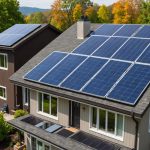Understanding Smart Home Integration for Solar Energy
Smart Home Integration in the realm of Solar Energy Management offers a revolutionary means of overseeing energy consumption. By incorporating smart devices, homeowners gain precise control over their energy usage, ensuring efficiency and sustainability. This integration provides real-time data, enabling users to make informed decisions regarding their solar energy systems.
Smart home technologies related to solar energy typically include smart thermostats, intelligent lighting systems, and solar-compatible inverters. These devices communicate with each other, as well as with solar panel arrays, to optimise energy distribution throughout the home. By monitoring consumption, these systems can adjust settings automatically to align with energy production.
Additional reading : Transform Your Space: Seamless Temperature Control and Monitoring Using Smart Thermostats via Your Smartphone
The benefits of integrating smart devices are manifold. Firstly, they enhance energy efficiency by automatically regulating usage, which can lead to significant cost savings. Additionally, they contribute to a smaller carbon footprint. Features to look for in smart home solutions include compatibility with existing systems, user-friendly interfaces, and the ability to remotely access data.
In sum, understanding and utilising Smart Home Integration for effective Solar Energy Management not only promotes economic savings but also fosters a sustainable lifestyle, representing an intelligent shift toward eco-friendly living solutions.
This might interest you : Revolutionizing Mental Health Monitoring: The Impact of AI-Driven Mobile Apps for Enhanced Support and Tracking
Smartphone Applications for Tracking Solar Energy Efficiency
In the realm of solar energy management, specialised smartphone apps play a pivotal role, providing users with hands-on tools for energy monitoring and enhancing energy efficiency. These applications allow homeowners to track the performance of their solar panel systems in real-time, directly from their phones.
Popular Apps and Their Key Features
Many apps are designed for monitoring solar panel performance, offering features like real-time data updates and historical energy usage data. Apps such as SolarEdge and SunPower enable users to check their energy output easily. These applications present data in user-friendly interfaces, making it simple to understand and act upon.
Enhancing User Experience in Energy Tracking
For improved user experience, successful apps offer custom alerts and suggestions for energy efficiency strategies. Notifications can inform users of significant changes in energy output, prompting timely maintenance or adjustments to optimize solar panel performance.
Tips for Effective Utilization
To make the most out of these smartphone apps, users should routinely review their data and be familiar with their interface. Understanding how to interpret the graphs and charts can guide informed decisions and enhance overall energy efficiency. Regularly updating the app ensures access to the latest features and improvements in monitoring capabilities.
Practical Strategies for Maximizing Solar Panel Performance
Solar Panel Optimization is key to leveraging solar technology effectively. Routine maintenance and inspection play vital roles in maintaining optimal efficiency. Regular checks ensure that panels remain in good condition, free from dirt and debris which can impact performance. Energy Efficiency Strategies should include assessing the tilt and orientation of panels to maximise sunlight exposure.
Identifying Real-Time Adjustments
Incorporating smart technology allows for real-time performance adjustments. Smart inverters can regulate and optimise energy output based on system data, ensuring panels operate at maximum capacity. This dynamic approach helps adapt to changing weather conditions, improving overall efficiency.
Understanding Energy Consumption Patterns
Another crucial strategy involves comprehending your home’s energy consumption patterns. By analysing usage data, you can identify peak consumption times and adjust your solar energy system accordingly. Implementing this practice aids in balancing energy production with consumption needs, ensuring efficient energy management.
Proactive Maintenance Tips
Routine cleaning, visual inspections for damage, and monitoring of energy output are necessary actions. Engaging professional services for annual inspections can further aid in diagnosing potential issues early. By continuously optimizing these strategies, homeowners can achieve better solar performance and enhance their investment in solar energy systems.
Case Studies in Successful Smart Home Solar Implementations
Exploring case studies offers valuable insights into successful integrations of smart technology with solar energy. These real-life examples demonstrate how homeowners have effectively utilised smart home integration to optimise solar energy management, resulting in remarkable energy savings and sustainability.
One prominent case involved a suburban home that integrated smart thermostats and intelligent lighting systems with their solar panels. This setup not only reduced energy bills but also minimised their carbon footprint. The household reported a 30% reduction in energy consumption, showcasing the efficiency of smart technology.
Another example highlights a rural dwelling that adopted solar-compatible inverters and smart applications for real-time energy tracking. By monitoring energy use patterns, the household tailored their energy consumption to peak solar production times. This approach maximised output and minimised reliance on grid power, leading to substantial cost savings.
Key takeaways from these implementations reveal the importance of:
- Choosing compatible smart devices.
- Regularly monitoring energy data.
- Adjusting usage based on energy production insights.
These cases illustrate that by leveraging smart home integration, homeowners can significantly enhance their solar energy systems. They provide a learning opportunity for others considering similar transitions, highlighting the benefits of innovation in energy management.
The Future of Smart Home Technologies in Solar Energy
Emerging technologies are set to transform how we manage solar energy in the coming years. Advancements in smart home technology include more sophisticated energy management systems and solar innovations. These new tools promise increased automation and improved energy efficiency.
Future trends suggest that integrated systems capable of learning from user habits and optimizing energy use autonomously will become prevalent. These technologies, often AI-driven, analyze patterns and make adjustments, ensuring homes utilize natural resources to their fullest potential. As systems grow smarter, they will predict energy needs, shifting loads in response to solar production for optimal performance.
Looking ahead, monitoring and efficiency tools will become more intuitive and user-friendly. Enhanced software will allow homeowners to interact with their energy systems effortlessly, providing insights and suggesting actions to maximize solar panel output. Moreover, the integration of next-gen battery storage solutions will enable households to store surplus energy more effectively, increasing grid independence.
The potential impacts on homeowners include significant cost savings, reduced environmental footprints, and greater control over energy use. By embracing these solar innovations, the shifting landscape will enable a seamless transition to sustainable energy solutions, advancing the role of smart home technologies in solar energy.










